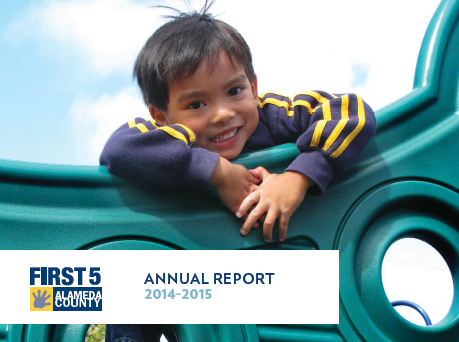December, 2015
The Annual Report is here!

Our 2014-2015 Annual Report covering the second year of our 2013-2017 Strategic Plan is here. The report is organized around 4 result areas and reflects the work of all our partners:
-
Stable, supportive, and nurturing environments for children
- Children are prepared for school through quality Early Experiences
- Children Reach their Optimal Developmental Outcomes
- Comprehensive, coordinated early childhood system in Alameda County
We’ve worked passionately and collaboratively to provide high quality services to young children in Alameda County and hope the hard work is reflected in our report. Please don’t hesitate to get in touch with us if you have any questions or suggestions on how we can advance our communities collective work of helping children thrive.
Funder's Guide on School Readiness

The Pritzker Children's Initiative and The Bridgespan Group released a new paper that estimates that 1 in 4 kindergarteners nationwide are not ready to learn when they reach kindergarten. This means that a quarter of children do not have the skills, knowledge, and attitudes necessary for success in school. Those numbers are even higher in Alameda County with more than 2 out of 5 children deemed not ready. In response to this overwhelming statistic, Achieving Kindergarten Readiness for All Children: A Funder’s Guide to Early Childhood Development from Birth to Fiveoutlines specific, evidence-based early childhood investment opportunities that have been proven to increase school readiness. Our takeaway from the report: First 5 Alameda County is at the forefront of new outcomes-oriented approaches to early childhood. In fact, the report comes out looking very similar to the First 5 Alameda County strategic plan.
The guide gives the following five recommendations:
1. Strengthen public systems of early care and education at state and local levels to ensure continuous quality improvements. F5AC supports systems change for the early childhood system through our participation on leadership bodies like the Alameda County Interagency Children’s Policy Council. We’re also helping to shape the regional approach to quality improvement through our Alameda County Quality Counts initiative. Through our trainings we work with providers to disseminate best-practices in early childhood. To reach the youngest children in our county, we also fund in-home prenatal and postpartum support for mothers and their babies as part of the Alameda County home visiting system.
2. Scale health and developmental screenings to connect parents and families with resources to optimize their children’s holistic development. Our Help Me Grow team has pushed for comprehensive screening and referral systems throughout Alameda County, supporting pediatric practices to integrate screenings and referrals into well-child visits and disseminating promising screening and assessment tools.
3. Improve the training, continuing education, professional development, and compensation of early childhood educators. We host about 40 trainings a year on core or emerging topics for professionals in the early childhood system. In addition, though our Quality Counts work, we’re increasing the availability of on-the-job coaching for early childhood educators.
4. Support greater access to high-quality evidence-based programs that help parents and families to foster their children’s development. Our leadership in the parent resource website Alamedakids.org simplifies the latest research in childhood development and connects parents to resources. We also reach parents through home visiting programs that help parents find prenatal care, foster healthy child attachment, understand childhood development, receive mental health treatment and connect to other sectors of the childcare system. In addition, our Community Grants Initiative builds the capacity of organizations to implement evidence-based early childhood programs.
5. Promote and share ongoing program innovation and improvement, especially for those programs supporting parents and informal caregivers. With so many of our county’s children in informal early child care settings, we use social marketing and partner with trusted community organizations to communicate the most up to date practices in early care and education to those working in informal settings. Our rigorous evaluations processes help us work with partners to track what’s working, where systems can improve and how to apply learning to future programs.
Children who enter kindergarten ready to learn are more likely to graduate from high school, attend college and earn a higher income. According to research from the Center on Children and Families at the Brookings Institution, when a young child enters kindergarten ready for school, there is an 82 percent chance he or she will master basic skills by age 11, compared with a 45 percent chance for children who are not school-ready.
First 5 Alameda County is proud to see our work reflected in the programs and strategies that are proven to work, supporting not just kindergarten readiness, but the skills that children need to do well in life.
 Legislative Update: Every Student Succeeds Act
Legislative Update: Every Student Succeeds Act
Last week, President Obama signed the Every Student Succeeds Act (ESSA). This rewrite of "No Child Left Behind" gives greater powers to local school districts, reduces the emphasis on standardized test scores in holding schools and students accountable, and in general moves away from top-down reforms from Washington and Sacramento.
Most importantly, ESSA recognizes early childhood education and development is a critical component of the K-12 continuum. It acknowledges the urgent need for the federal government to support states to require better alignment of early learning programs, preschool programs, and elementary schools.
There are 1.3 million children aged 0 to 5 in California and not nearly enough funding to support them. Federal support of early learning and child care providers is essential if this crucial part of the education continuum is going to improve quality and expand slots.
While California legislators have slowly begun to rebuild the State’s early learning system, which was devastated by budget cuts in California during the Great Recession, parents continue to have an enormous unmet need. “This is a big step in acknowledging the importance of early childhood“ says Janis Burger, First 5 Alameda County, CEO. “We look forward to working with the State on the implementation of the new legislation and in continuing to push for even more public support for young children.”
.